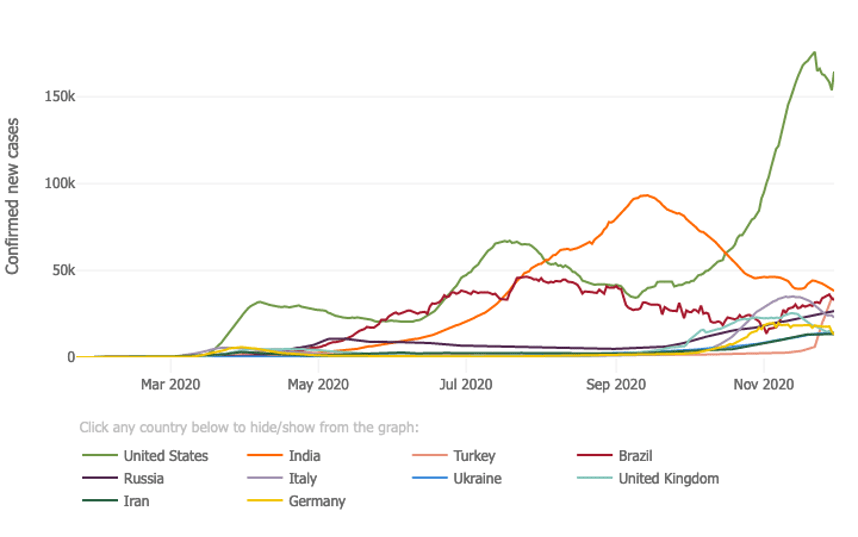
December 1, 2020; National Public Radio and the New York Times
Let’s face it. For the first time in US history, an acting president was bent on actively promoting and spreading misinformation about a pandemic that continues to ravage the country. With 13.6 million COVID-19 cases—a fourth of the cases worldwide—and 269,234 deaths, we can safely say that our government was at war with its own citizens. Surpassing India (9.4 million cases and 137,621 deaths) and Brazil (6.3 million cases and 173,120 deaths), the United States is incomprehensibly still at the top of the list of the current 10 most affected countries by the pandemic. Talk about American exceptionalism.

There is no denying that the “deep state” under Trump worked tirelessly to convince US workers and their families that the pandemic was a worldwide hoax. The daily propaganda that came out of the White House can only be compared to China’s, both governments bent on convincing the populace that true patriots should only trust its top officials and anyone who says the contrary are enemies of the state. State-sponsored COVID propaganda is not unique to the US, but it has claimed the most lives.
We can no longer be blindsided and perpetuate a false narrative that all Trump supporters are “extremists.” Although there is no denying that white supremacy and far-right hate groups gained too much ground under Trump, we also witnessed an unparalleled bending of the truth by the most powerful institution in the country and its political arm. I daresay that most of Trump supporters fell prey to his lies, unable to connect growing inequity and disappearing opportunities to systemic problems, and many still believe every word their caudillo says.
Sadly, as we’ve covered on NPQ before, this reality disruption and the lack of government action to protect us from COVID is directly correlated to a failing democracy. Only a functioning democracy will be able to rescue us from this misinformation nightmare—one that, some will claim, can only be counteracted with active propaganda.
As such, it is not surprising to see millionaire efforts announced to begin immediate national education efforts and rescue the US from this seeming unstoppable pandemic. COVID Collaborative, for example, just announced a nationwide public-private initiative with the Ad Council towards a $50 million vaccine education campaign. The effort is being done in collaboration with entities such as Johns Hopkins University, the American Public Health Association, CDC Foundation, National Association of County and City Health Officials, the National Governors Association, the US Chamber of Commerce, in partnership with the NAACP, National Congress of American Indians, UnidosUS, among others.
Sign up for our free newsletters
Subscribe to NPQ's newsletters to have our top stories delivered directly to your inbox.
By signing up, you agree to our privacy policy and terms of use, and to receive messages from NPQ and our partners.
Surveys conducted by multiple polling agencies showed that only 58–64 percent of American adults would be willing to get vaccinated against COVID-19. Therefore, the Ad Council is preparing for “the largest public education campaigns in history” and roll out public announcements en masse across mediums as soon as vaccines are ready for distribution.
“Frankly, this is the biggest public health crisis we’ve ever faced, and we don’t have time to waste,” Lisa Sherman, the group’s chief executive, told the New York Times. “We’re working in advance, so that once those vaccines are proven to be safe and approved by all the right people, we’re ready to go.”
Gaurav Suri, a psychologist and computational neuroscientist from San Francisco State University, told NPR that the choice of words and communicational styles will be extremely important for an effective public campaign. Republicans are inclined to react more positively to words like “protection plan” than a “mask mandate,” he explained.
“If any public policy is going to work, it’s very important that it be compatible with people’s communication preferences and styles,” said Dr. Suri. “Making big changes requires us to tailor and communicate public policy in a way that’s going to be open for all segments of the population.”
Hopefully, by the end of next year, most of us will be vaccinated. In the meantime, all efforts are appreciated to help protect us from viral misinformation.—Sofia Jarrin












